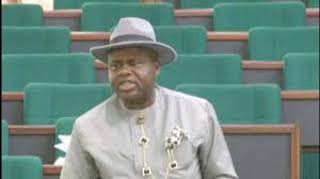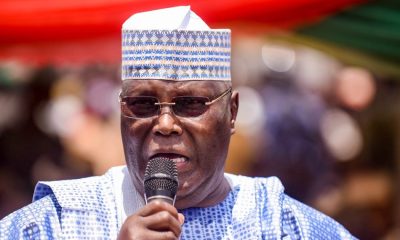NEWS
Bayelsa to Commission Over 20 Projects On Diri’s Second Anniversary

No fewer than 20 roads, educational, health, media and agricultural projects will be inaugurated during the second anniversary in office of the Bayelsa State Governor, Senator Douye Diri, on February 14.
The projects include those inherited from the past administration and completed in the last one year and others initiated by the Governor Diri government during same period.
The anniversary activities will commence a week before February 14 and will continue till the end of the month due to the number of projects lined up for inauguration.
Vice President Yemi Osinbajo is expected to flag-off a bridge project across River Nun at Angiama linking Oporoma, headquarters of the Southern Ijaw Local Government Area.
Governor Diri, at the weekend, inspected some of the projects at various stages of completion.
They include the Yenagoa-Oporoma road, Bayelsa State Mega Media Complex for Radio Bayelsa, Niger Delta Television and the Bayelsa Newspaper Corporation.
Others were the Igbedi road, Glory Drive road, Bayelsa Transport Terminal at Igbogene, Phase One of the Igbogene/AIT Ring Road, the Elebele bridge, the Onopa bridge and its access roads.
Speaking to journalists after the inspection, the Commissioner for Works and Infrastructure, Surveyor Moses Teibowei, disclosed that between 20 and 30 projects in various sectors would be ready for commissioning.
Mr. Teibowei said the contractors have been mobilised and mandated to complete the projects
within specific time in readiness for their commissioning.
He said: “Between 20 and 30 projects should be ready, not only in the Ministry of Works and Infrastructure but also in education, health, agriculture and other sectors.
“My target is to complete assigned projects and I strongly believe that some of the projects visited will be completed.”
Governor Diri, who commended the Works Commissioner, described him as a capable hand with a competent team.
He stated that based on reports he received on the progress of work, he decided to have first hand knowledge of what had been achieved so far.
His words: “What I have seen is quite commendable. You know I have a very capable hand in the Ministry of Works and very competent monitors.
“I have been receiving reports. I came myself to confirm the reports that I have received so far.
“What we have seen is very commendable and we are sure that the targets will be kept.”
A jubilant crowd welcomed the governor and the inspection team at Angiama, a riverine communuty in Southern Ijaw Local Government Area, who saw cars for the first time when the road project got to the community.
The people could not hold back their joy on seeing the governor and his convoy and showered praises on him for the Yenagoa-Oporoma road project, which was inherited from the immediate past administration in the state.
The Bayelsa Central Senatorial District road is one of the federal projects in the state that had been on the drawing board for over 50 years before the state government undertook its construction.
The other federal projects are the Nembe-Brass and Sagbama-Ekeremor roads.
The Speaker of the Bayelsa State House of Assembly, Mr. Abraham Ingobere, who was also on the governor’s entourage, equally expressed satisfaction with the quality of work by the different contractors.
Mr. Ingobere said it was the assembly’s duty to approve funds for execution of projects just as it was in their place to monitor such projects to ascertain value for money.
The Speaker promised that the assembly will continue to support the executive arm of government to deliver more Infrastructure to Bayelsans.
Others on the inspection team were the leader of the assembly, Monday Obolo-Bubou, Chief of Staff, Government House, Chief Benson Agadaga, Commissioner of Information, Orientation and Strategy, Mr. Ayibaina Duba among other top government functionaries.
NEWS
Osun HoS, Aina Celebrates Adeleke’s Chief of Staff, Akinleye on Birthday Anniversary

From Ayinde Akintade, Osogbo
Osun State Head of Service, Elder ‘Leye Aina has rejoiced with the Chief of Staff to Governor Ademola Adeleke, Alhaji Kazeem Akinleye, on his birthday today
The Head of Service in his birthday’s congratulatory message to the Chief of Staff and made available to newsmen in Osogbo, the Osun State capital, noted that Alhaji Akinleye is not only a God – given gift to the incumbent administration of Governor Adeleke, he is a complete divine gift to his ancestral home of Edeland because of his laudable contributions.
“Alhaji Akinleye is one of the very few political giants and highly experienced politicians who started his political career from the position of a Ward Councillor and rose to become a Local Government Chairman before his appointment as the Chief of Staff.
“In the history of Osun State, Alhaji Akinleye can be described as the best Chief of Staff so far who is accessible, firm, humane, approachable and ever ready to defend the truth.
“The Chief of Staff’s remarkable qualities, including forthrightness, contentment, courage, genuine friendship and compassion, have made him a beloved figure among his admirers, colleagues and associates.
The Head of Service noted that his heartfelt message includes prayers for Alhaji Akinleye’s continued strength, joy and influence. He prayed that his star will never go dim.
“As I wish you Happy Birthday, long life and prosperity, may the Almighty God never deny you of the reward of your love and sacrifice.
“On behalf of my family, I say Happy Celebration to you, our own Chief of Staff, the Head of Service concluded.
Foreign News
China Tightens Export Rules for Crucial Rare Earths

China has tightened export controls on rare earths and other materials critical for advanced tech manufacturing as trade negotiations continue with the US.
It processes around 90% of the world’s rare earths, which go into everything from solar panels to smartphones – a key bargaining chip ahead of an expected meeting between Chinese leader Xi Jinping and his US counterpart Donald Trump this month.
Beijing had already restricted processing technology and unauthorised overseas co-operation, but Thursday’s announcement formalised the rules.
Foreign companies now need the Chinese government’s approval to export products with even small amounts of rare earths and must explain their intended use.
The ministry announced similar restrictions on the export of lithium batteries and some forms of graphite, which are also essential components in the global tech supply chain and largely produced in China.
Beijing said the regulations are intended to “safeguard national security”. One of the main targets of these controls appears to be overseas defence manufacturers, including those in the US, who rely on rare earths from China.
China had added several rare earths and related material to its export control list in April, as the trade war with Washington ramped up, which caused a major global shortage.
But the new announcement makes clear that licenses are unlikely to be issued to arms manufacturers and certain companies in the chip industry.
Even the technology used to mine and process rare earths, or to make magnets from rare earths, can only be exported with permission from the government, the Commerce Ministry said.
Chinese firms are also banned from working with foreign companies on rare earths without government permission.
The latest announcement also clarifies the specific technologies and processes that are restricted.
These include mining, smelting and separation, magnetic material manufacturing, and recycling rare earths from other resources.
The assembly, debugging, maintenance, repair, and upgrading of production equipment are also prohibited from export without permission, the announcement added.
This could have a major impact in the US, which has a significant rare earths mining industry but lacks processing facilities.
The new regulations create Beijing’s version of US rules which block countries from selling chip-making equipment to China.
The US has used those measures to slow China’s development of powerful chips that could be used for artificial intelligence (AI) with military applications.
Trade expert Alex Capri believes China’s new regulations “are specifically timed” ahead of Xi and Trump’s expected meeting later this month.
Beijing has targeted key vulnerabilities in US electronics and weapons manufacturing, mirroring America’s earlier moves against China’s chip industry, he added.
Rare earths are a group of 17 chemically similar elements that are crucial to the manufacture of many high-tech products.
Most are abundant in nature, but they are known as “rare” because it is very unusual to find them in a pure form, and they are very hazardous to extract.
Although you may not be familiar with the names of these rare earths – like neodymium, yttrium and europium – you will be very familiar with the products that they are used in.
For instance, neodymium is used to make the powerful magnets used in loudspeakers, computer hard drives, electric car motors and jet engines that enable them to be smaller and more efficient.
China has a near monopoly on extracting rare earths as well as on refining them – which is the process of separating them from other minerals.
The International Energy Agency (IEA) estimates that China accounts for about 61% of rare earth production and 92% of their processing.
Foreign News
Madagascar President Asks for One Year to Resolve Problems or Resign

Madagascar’s President Andry Rajoelina has asked for one year to fix the country’s challenges, promising that if they persist, he will resign.
He said this during a town-hall style meeting at his palace with various groups of government supporters. Many attendees had the opportunity to ask the president questions or simply share their views – to which he responded.
“I don’t want flattery.
I want to hear the truth. It’s the people who kept telling me that everything was fine who are responsible for our current situation,” he said.The movement behind the protest, known as Gen Z Mada, has been calling for the president to resign – and rejected an invitation to attend the talks.
They argue that they cannot engage a government that has been repressing them as they demand basic human rights. The group has called for new protests on Thursday.
“We refuse the president’s invitation to talks. We will not engage in dialogue with a regime that represses, assaults, and humiliates its youth in the streets,” they wrote on their Facebook page.
At the expiry of their 48-hour ultimatum for the president to resign, the group called for a nationwide strike, although the details remain unclear.
They have vowed not to back down, urging people from all regions to join them and declaring that “the Malagasy people do not submit”.
Rajoelina has been holding these meetings as part of his pledge to “listen more”, emphasising that the challenges facing the Indian Ocean island nation can only be solved through honest conversations and not protests.
The president assured those at the dialogue that ongoing power projects would address the recurring outages by adding 265 megawatts to the national grid.
“I swear that if power cuts persist in the capital within a year, I will resign,” he said.
The protests began on 25 September triggered by anger over persistent power and water shortages, and have escalated into broader dissatisfaction over corruption, high unemployment and the cost-of-living crisis.
Last week, Rajoelina sacked his entire government and appointed an army general as prime minister on Monday. The protest movement rejected the appointment and vowed to continue their struggle.
Rajoelina came to power in 2009 after leading mass protests that triggered military intervention and overthrew then-President Marc Ravalomanana.
Although the youth-led movement continues to demand his resignation, street protests appear to have weakened.
Life in most parts of the capital, Antananarivo, continues as normal, except in a few neighbourhoods with a heavy police presence, where some roads have been blocked or are being closely monitored.
At least 22 people have died in clashes with security forces and scores more have been injured, according to the United Nations. The authorities have disputed these figures.




















